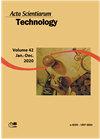Physiological response of the protective enzymatic mechanism of Pontederia parviflora Alexander caused by chromium absorption stress
IF 0.6
4区 综合性期刊
Q3 MULTIDISCIPLINARY SCIENCES
引用次数: 0
Abstract
The use of plants to eliminate organic or inorganic compounds is one of the alternatives for environmental treatment, but to guarantee the efficiency of process is necessary to know the effects in plant metabolism. This study sought to evaluate the enzymatic mechanism involved in the protection of the metabolism of Pontederia parviflora Alexander caused chromium absorption stress. The experiment was carried with solution of chromium (III) in three concentrations (10, 50 and 100 ppm) in the period of four days and evaluations daily. The concentration of chromium in the solution influenced the form of storage of metal in the tissues of plants. In 24 hours, there was increase of glutathione in the root in 10ppm solution and in 50 and 100 ppm the accumulation of glutathione occurs in the stem, coinciding with the peak absorption metal (48 hours). The activity of the catalase was higher in the roots, the peroxidase showed higher activity at the 50 ppm concentration, and the guaiacol had similar activity to catalase. The tolerance of P. parviflora in response to chromium stress occur for complex mechanisms, phytohormone-producing as significantly regulated under Cr stress and the formation of phytoquelatins was in sync with the absorption of metal. Due to the tolerance shown by P. parviflora, it becomes important for the environmental treatment of contaminated water.铬吸收胁迫下庞德马保护酶机制的生理响应
利用植物去除有机或无机化合物是环境处理的替代方法之一,但为了保证处理的效率,有必要了解其在植物代谢中的作用。本研究旨在探讨微花庞德马(Pontederia parviflora Alexander)代谢引起的铬吸收胁迫的酶保护机制。实验采用10、50和100 ppm三种浓度的铬(III)溶液进行,为期4天,每天进行评估。溶液中铬的浓度影响金属在植物组织中的储存形式。在10ppm溶液中,24小时根中谷胱甘肽含量增加,在50和100 ppm溶液中,茎中谷胱甘肽积累发生,与吸收金属的峰值(48小时)一致。根中过氧化氢酶活性较高,过氧化物酶在50ppm浓度下活性较高,愈创木酚与过氧化氢酶活性相近。细小假单胞菌对铬胁迫的耐受机制复杂,铬胁迫下植物激素的产生受到显著调控,植物凝胶蛋白的形成与金属的吸收同步。由于细小假单胞菌表现出的耐受性,其在污染水体的环境处理中具有重要意义。
本文章由计算机程序翻译,如有差异,请以英文原文为准。
求助全文
约1分钟内获得全文
求助全文
来源期刊

Acta Scientiarum-technology
综合性期刊-综合性期刊
CiteScore
1.40
自引率
12.50%
发文量
60
审稿时长
6-12 weeks
期刊介绍:
The journal publishes original articles in all areas of Technology, including: Engineerings, Physics, Chemistry, Mathematics, Statistics, Geosciences and Computation Sciences.
To establish the public inscription of knowledge and its preservation; To publish results of research comprising ideas and new scientific suggestions; To publicize worldwide information and knowledge produced by the scientific community; To speech the process of scientific communication in Technology.
 求助内容:
求助内容: 应助结果提醒方式:
应助结果提醒方式:


